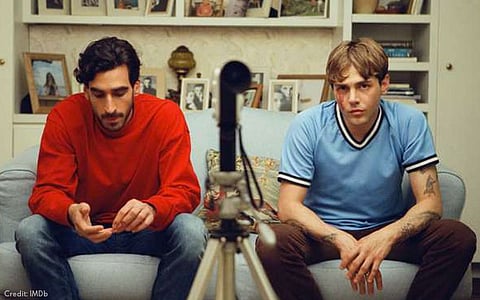
- Reviews
- Power List 2024
- Cannes 2024
- In-Depth Stories
- Web Stories
- News
- FC Lists
- Interviews
- Features
- FC SpecialsFC Specials

In Xavier Dolan's Matthias & Maxime, the director — playing the latter half of the title — sports a wine-red birthmark that pools over the right side of his face. From the outside, this may be the most distinctive aspect about Maxime. He's just another bloke, leading just another nondescript life, with just another nondescript best friend in a lawyer named Matthias (Gabriel D'Almeida Fritas). Or is there more to this friendship? They'll soon get to find out, when they are arm-twisted into acting in the student film of a friend's sister. The scene requires them to kiss. Matthias & Maxime lean forward and… CUT. Dolan doesn't show them kissing. He's more interested in the aftermath. First, we see Matthias writhe. Then, it's Maxime's turn. The former stretch is definitely the film's, well, better half.
There's an "old married couple" vibe to their decades-long friendship. When Matthias washes the dishes, Maxime stands beside him, wiping them. When Matthias is peeing, Maxime walks in to brush his teeth. We get to know they've already kissed once, in high school. They seem to have dismissed that as youthful folly, but this kiss, as grown-ups, is different. The film feels like an extension of Lynn Shelton's Humpday (2009), where two hetero friends end up in bed on a dare — only here, the heterosexuality is not exactly a given. Watch Matthias — a girlfriend notwithstanding — look at Maxime (it looks like longing), or watch Maxime eye a man on the subway (it looks like flirtation). There's always been an element of hysteria in Dolan's work, but here, it's relegated to the soundtrack — a rippling piano suggests a spectrum of emotional states. It ripples loudest when Matthias goes for a long swim — perhaps, this situation's equivalent of a cold shower.
Matthias silently nurtures whatever he's feeling, and it grows feverishly and explodes at a party. We really feel for him. He thought he had his life all sorted out, and now…this! He's helpless. He calls Maxime an "ink stain" — by hurting him, he's hurting himself. But the drama becomes less interesting when the focus shifts to Maxime. (His fractured relationship with his mother feels like an outtake from Dolan's own Mommy.) The big question is: Will Matthias & Maxime figure out what this is all about before Maxime leaves for Australia? Unfortunately, the film now begins to resemble a soap opera about star-crossed lovers. A scene where Maxime discovers a grade-school drawing of him and Matthias is a particular low point. There are films where Dolan seems to be remapping the contours of desire. This one feels like he lost the compass midway.
***
The Godfather meets Goodfellas in Marco Bellocchio's The Traitor, whose title refers to Tommaso Buscetta (Pierfrancesco Favino), the first high-ranking member of the Cosa Nostra to break the organisation's oath of silence. This is a condensed biopic, focusing on the years between Buscetta's decision to snitch and the last days of his life. The problem is that these real-life characters are so unfamiliar (and there are so many of them) that most of them get reduced to "guy who did bad things". We crave some specificity, something that will take us into their families and souls (like The Godfather did), or at least, their motives and hearts (as Goodfellas did). Still, it's fun watching the proceedings being recreated in meticulous detail. At one point a defendant turns hostile and sews his mouth up. The hapless judge cries out, "How did he get a needle and thread?" Talk about an oath of silence.
***
Quentin Tarantino addressed allegations of foot-fetishism in his films by… having more shots of feet in Once Upon A Time In Hollywood. Something similar could be said about Abdellatif Kechiche. When his Mektoub, My Love: Canto Uno, adapted from François Bégaudeau's novel La Blessure, la vraie (The Real Wound), premiered in Venice, people complained about the excessive objectification of women, who seemed reduced to a series of butt shots. The sequel, Intermezzo, is practically a three-and-a-half hour advertisement for fleshy buttocks. The camera stares and stares. The highlight (or low point) is the 10-minute cunnilingus scene where the woman keeps getting spanked, and we see her bottom gradually reddening. And yet, there's not a hint of male nudity. When a nude man gets out of bed, the camera coyly cuts away (as does the editor). But the woman beside him is sprawled out in all her natural glory, face to the pillow, butt in the air.
Context is key, of course — and all could be forgiven if the protagonist, Amin (Shaïn Boumédine), were, say, a glutologist. But no, he's a Paris-based photographer and screenwriter. This sequel meanders as maddeningly as its predecessor, which at least had stray moments of grace, like the scene that showed the birth of a lamb. But here, despite plot points that could be developed (like a problematic pregnancy), all we seem to be doing is watching a series of free-association conversations in a nightclub. Kechiche is a genius at capturing a fly-on-the-wall feel, but the complete lack of event kept me looking at the time. My watch kept saying: Life's too short for this shit. Anyway, I survived, and now, I need to head back home. It's a wrap, folks. See you next year.